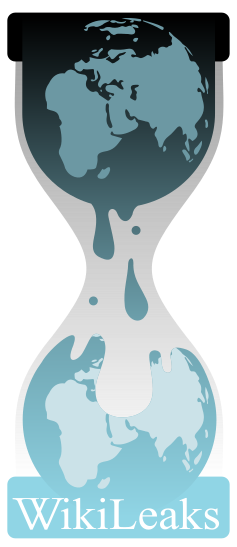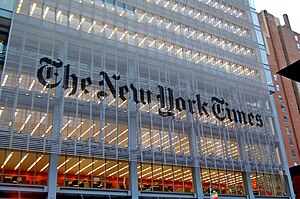
- Image via Wikipedia
That was fast. But we live in an accelerated age. It is not entirely clear who the defenders are of Julian Assange, but they seem to be generally people of the hard Left and monomaniacal anti-authoritarians such as Glenn Greenwald, who, in his ill-defined ambi-political orientation, can embrace both extremes of incoherent opposition to state power. Writes Greenwald,
Then there’s the somewhat controversial claim that our major media stars are nothing more than Government spokespeople and major news outlets little more than glorified state-run media.
Not surprisingly, Greenwald is an advocate of this “controversial claim.” The fact that many, such as I, are critical of The New York Times and other newspapers for publishing anything at all of the Wikileaks diplomatic cables release does not register with him as a counter to his position. That, complexly, the Times, by seeking government guidance on what identities should be wisely elided from published versions might be pursuing its own vision of responsible citizenship is irreconcilable with the absolutist Greenwald’s commitment to attacking the idea of state authority. He himself approvingly cites Digby, in her expression of the essential, unrefined devotion to the commandment to “question authority.”
My personal feeling is that any allegedly democratic government that is so hubristic that it will lie blatantly to the entire world in order to invade a country it has long wanted to invade probably needs a self-correcting mechanism. There are times when it’s necessary that the powerful be shown that there are checks on its behavior, particularly when the systems normally designed to do that are breaking down. Now is one of those times. . . . .As for the substance of the revelations, I don’t know what the results will be. But in the world of diplomacy, embarrassment is meaningful and I’m not sure that it’s a bad thing for all these people to be embarrassed right now. Puncturing a certain kind of self-importance — especially national self-importance — may be the most worthwhile thing they do. A little humility is long overdue.
This is an emotion masquerading as an idea, as, in fact, Digby introduces it. As I wrote yesterday, the Cables release, in contrast, to Afghan releases, shows clearly that rather than a specific anti-war political goal, Assange has, as he openly expresses, a philosophically anarchic agenda, and it is completely incoherent, unless one simply wishes to take emotional revenge – joy in a little embarrassment – from a resented center of power. Digby’s comment above, with a different source of resentment, might just as easily have come from a Tea Partier.
Sensible thinking on the subject comes from both sides of the political divide, which is why the bloom already fades from Assange’s shriveling rose. Here is the liberal James Rubin:
Yet those on the hard left are usually the loudest critics of America imposing its own values, its own way of doing business, and its own culture on other countries. For better or worse, in many parts of the world there’s a big difference between what government officials are prepared to do publicly and what they’re prepared to say and do privately. We may wish it otherwise, but those are the realities faced by U.S. officials. The hard left, so quick to demand that America accept other countries’ political systems, now seems blind to the fact that other governments want to have the right to say one thing in public and a different thing in private. By respecting that difference, American diplomats are doing their job. Surely the Obama administration, like the Bush administration before it, would prefer for Arab leaders to be as honest and open and transparent as we are in our country. Until such democratic values come to the Arab world, however, we have to work with what we’ve got. U.S. diplomacy has been damaged, not destroyed; it will recover after a time. But for now, Wikileaks is making diplomacy’s task a whole lot harder.
And here is the conservative Max Boot, citing the Times’ rationale that “[a]s daunting as it is to publish such material over official objections, it would be presumptuous to conclude that Americans have no right to know what is being done in their name”:
Isn’t it presumptuous to assume that readers of the New York Times have no right to know what is being done in their name by the editors of the New York Times? Isn’t it important for us to learn “the unvarnished story” of how the Times makes its editorial decisions — such as the decision to publish the WikiLeaks documents? Sure, we know the official explanation — it’s in the newspaper. But what happened behind the scenes? Maybe there were embarrassing squabbles that will make for juicy reading? Therefore, I humbly suggest that in the interest of the greater public good (as determined by me), Bill Keller, the editor, and Arthur Sulzberger Jr., the publisher, should release to the world all their private e-mails and memos concerning WikiLeaks.
Actually, let’s make our document request broader: the Times should share with the world all its internal correspondence going back years. That would include, of course, memos that disclose the identity of anonymous sources, including sources who may have risked their lives to reveal information to Times reporters. Of course, just as it does with government documents, we would give the Times the privilege of redacting a few names and facts — at least in a few of the versions that are published on the Internet.
My suspicion — call it a hunch — is that the Times won’t accept my modest suggestion. Their position, in effect, is “secrecy for me but not for thee.” But why? Can the Times editors possibly argue with a straight face that their deliberations are more important and more privileged than the work of our soldiers and diplomats? No doubt the editors can see all the damage that releasing their own documents would do — it would have a chilling effect on internal discourse and on the willingness of sources to share information with Times reporters. But they seem blind to the fact that precisely the same damage is being done to the United States government with consequences potentially far more momentous.
The most persuasive argument the Times has made is that “most of these documents will be made public regardless of what The Times decides.” That’s true, but that doesn’t eradicate the Times’ responsibility for choosing to act as a press agent and megaphone for WikiLeaks.
Related articles
- The attacks of Wilileaks demonstrates how “out of touch” the media is (crooksandliars.com)
- Smart Takes on Wikileaks (reason.com)
- A Very Stupid Argument Advanced by Opponents of America (redstate.com)
- WikiLeaks – A No Brainer for The Gray Lady with a Conscience (gutenbergpr.com)
- WikiLeaks Diplomatic Document Dump Yields No Surprises (dailyfinance.com)
- WikiLeaks founder Julian Assange: What does he want? – Christian Science Monitor (news.google.com)



Assange is a scummier form of the old National Enquirer (before it got some respect). For one so intent on exposure as moral good, he certainly picks and chooses to whom he’ll provide his stolen documents, depending on how the papers have reported on him–all just a little matter of not liking the publicity he’s received. The Washington Post was shut out altogether, and the Times got in on the latest batch of documents only because of one of the English newspapers — a leak of the leaks, as it were. The terms Assange has tried to exact, which include the provision of substantial sums of money for the information and right to sue if the terms of agreement are not met, show him for what he is. He will be knocked off the pedestal he’s so presumptously set himself upon.
The Grizzly Mama called today for Assange to be “hunted down”. Frankly, I’m more concerned about how so many hundreds of thousands of so-called secret documents could have been downloaded without anyone blinking, and what’s being done to ensure against the possibility again.
Oh…people have to read, exercise critical thinking skills and have the time, money and access for what is revealed in Wikileaks to make a change for the better; and for at least the last thirty years, the system has been scrubbed to ensure only the right-minded people have those privileges.
I am with Digby on this one.
Maybe if our leaders and diplomats would act honorably on behalf of the PEOPLE instead of themselves, their corporate interests and power/greed, they wouldn’t have to worry about what comes out in Wikileaks.
And I am not leaving out the media or NYT since they too have credibility issues, does the name Judith Miller, ring any bells. If I was a betting person, I would lay odds there were and are plenty others who personal assets have swelled.
Until (or at least it would be a start) we have public political campaign financing, We The People will be taking the bullet, both literally and figuratively while elected and government officials, corporations and media enrich themselves with impunity.
They’re embarrassed? As if.
Yes, but CeeCee, there is nothing so far in these diplomatic documents – separate from your general disgust with people in power and the media – that is exposure of dishonorable contact or improper personal enrichment. They are simply the kinds of communications on sensitive issues for which diplomacy at all times everywhere has required discretion, just as organizations and individuals often need it. This was Rubin’s and Boot’s point. We know what Assange’s aim is: he wants to undermine state authority. Is that what you want? Do you know what you would put in its place and how it would realistically operate? How would you handle the communications among the many scores of states with complex and competing interests? No one allowed to talk in private?